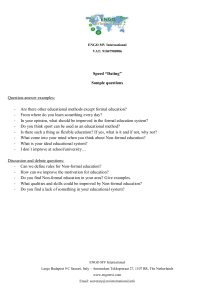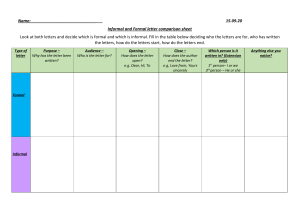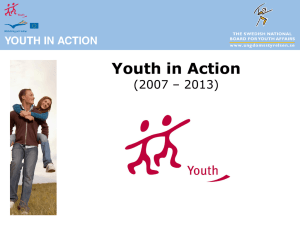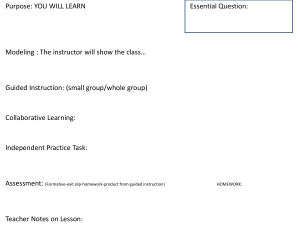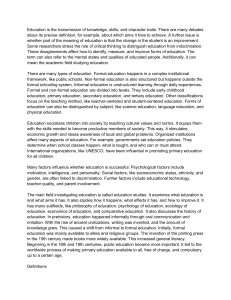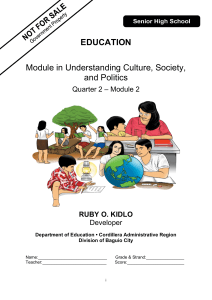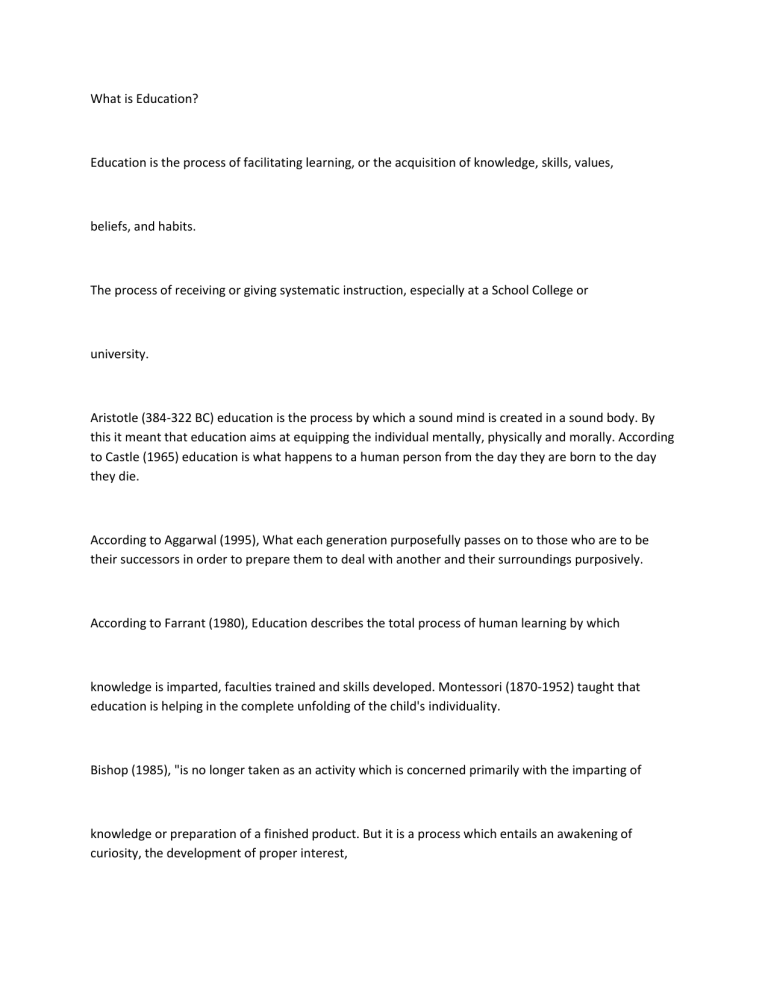
What is Education? Education is the process of facilitating learning, or the acquisition of knowledge, skills, values, beliefs, and habits. The process of receiving or giving systematic instruction, especially at a School College or university. Aristotle (384-322 BC) education is the process by which a sound mind is created in a sound body. By this it meant that education aims at equipping the individual mentally, physically and morally. According to Castle (1965) education is what happens to a human person from the day they are born to the day they die. According to Aggarwal (1995), What each generation purposefully passes on to those who are to be their successors in order to prepare them to deal with another and their surroundings purposively. According to Farrant (1980), Education describes the total process of human learning by which knowledge is imparted, faculties trained and skills developed. Montessori (1870-1952) taught that education is helping in the complete unfolding of the child's individuality. Bishop (1985), "is no longer taken as an activity which is concerned primarily with the imparting of knowledge or preparation of a finished product. But it is a process which entails an awakening of curiosity, the development of proper interest, attitudes and values and the capacity to think and judge for ones self. Jiddu (1895-1986) says that "the ignorant man is not the unlearned, but he who does not know him/herself and the learned man is stupid when he relies on books, on knowledge and authority to give him understanding". Understanding comes only through self knowledge. Basically there are three types of education: Formal education Informal education Non-formal education What is Formal Education? Formal education refers to the type of education provided by specially established institutions called schools. Under formal education, teaching and learning activities are carefully planned with particular educational objectives in mind and are guided by syllabuses, or course outline. Characteristics of Formal Education Planned with a particular end in view. Limited to a specific period. Well-defined and systematic curriculum. 13 ง Given by specially qualified teachers. Includes activities outside the classroom. Observes strict discipline. What is Informal Education? Its a lifelong process whereby every individual acquires attitudes, values, skills and knowledge from daily experience and the educative influences through conscious and unconscious means. Informal education works through and is driven by conversation which involves exploring and enlarging experiences that can take place in any setting. Characteristic of Informal Education Incidental (by chance) and spontaneous (natural Feeling) Not preplanned. Not imparted by any specialized agency. No prescribed time-table or curriculum. May be positive or negative. What is Non-formal Education? Non-formal education is any organized, systematic, educational activity carried outside the framework of the formal education to provide selected types of learning to particular subgroups in the society/community for adults as well as children. Characteristics of Non-formal Education It is not compulsory as compared to formal education. It takes place outside the realm of formal education. It is conscious and deliberate. It is organized for a homogeneous group. Serving the need of the identified group for a specific reason. The Nature of the School Curriculum The term "education" is derived from Latin words "educare" meaning to train, to bring and to nourish to lead out', So we can say that education is to bring up, to develop and shape up the individual talent and inner THE SCHOOL CURRICULUM The term "curriculum" is generally understood as the courses or programmes of study offered by an educational institution. The word curriculum evolved from the Latin word which is "currere" which literally means, "to run a course or a race course". It is all the activities which students need to engage in if they are to finish a programme of study and achieve the intended learning goals. Curriculum also involves the knowledge, a list of subjects to be studied, or a syllabus which includes all the planned experiences which learners may be exposed to in order to achieve the learning goals. BROAD, MIDWAY AND NARROW DEFINITIONS In its broadest sense a curriculum may refer to all the courses offered, the experiences and the activities learned in a school. In its midway definition, curriculum is defined as all the learning which is planned and guided by the school. In its narrower sense a curriculum may also be referred to as a defined and prescribed course of studies, which students must fulfill in order to attain a certain level of education. For example, in this University, first year students are supposed to register a certain number of courses within the first year of the first semester. SOME BASIC DEFINITIONS According to Taba (1962) "curriculum is a way and manner of preparing young people to participate as productive members of our society" Kerr (1968) describes curriculum as all the learning which is planned and guided by the school, whether it is carried in groups or individually, inside or outside of the school. Bishop (1985) considers curriculum as "learning experiences to be organised by teachers within and outside the school, to enable learners to adopt positive attitudes to learning to apply knowledge and skills and to develop their taste and a balanced sense of values" Tamakloe (1992) defined curriculum as "a composition of a selection of socially valued knowledge, Themes that are important This means that: 1. curriculum is an on-going or a continuous process 2. curriculum is not static but allows for change to take place 3. curriculum is restricted 4. curriculum seeks to educate individual BASIC COMPONENTS OF THE SCHOOL CURRICULUM In simple terms every school curriculum must at least have the following components; these are "the what, the how, the when and the why". That is the: Content: the subject matter (the what) Methodology: the manner or method of instruction (the how) Time frame: the order of instruction (the when) Rationale: the goals, aims or objectives (the why) Characteristics of the School Curriculum By nature curriculum is an educational activity. Curriculum is designed by the school and for the school. It responds to the changing needs of the society. Curriculum is a school activity but can also end up occurring outside the school. It is always meant to be a positive activity. Curriculum is a continuous process.
